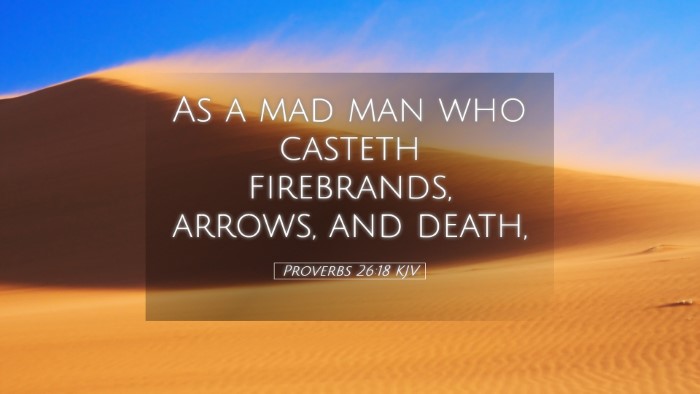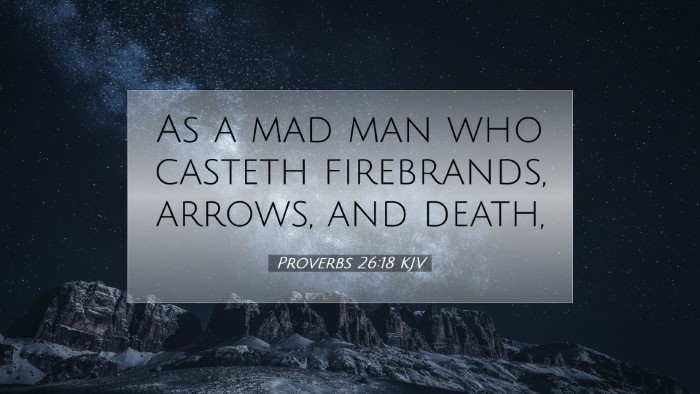Commentary on Proverbs 26:18
Verse: "As a madman who casteth firebrands, arrows, and death,"
Introduction
This verse from Proverbs utilizes vivid imagery to convey profound truths about the consequences of folly and recklessness. Drawing upon insights from public domain commentaries such as those from Matthew Henry, Albert Barnes, and Adam Clarke, we delve into the theological and practical implications of Proverbs 26:18.
Contextual Overview
The Book of Proverbs is primarily a collection of wisdom literature, guiding readers toward understanding moral conduct and the fear of the Lord. Importantly, this particular verse falls within a larger discourse about the nature of foolishness, contrasting the wisdom of the righteous with the folly of the wicked.
Exegesis of Proverbs 26:18
Matthew Henry offers valuable insight into the metaphorical language found in this verse. He points out that the "madman," in this context, symbolizes a person whose actions lack reason and restraint, akin to an arsonist who carelessly throws firebrands. This imagery illustrates how reckless behavior can lead to devastating outcomes.
Imagery of Madness
Henry's analysis of madness: The term 'madman' or 'fool' in the text suggests someone who is disposed toward chaos, an individual who acts without consideration of the consequences. Just as a madman sets fire to the environment around him, a fool endangers his community by his imprudent actions.
Elements of Destruction
As per Albert Barnes, the 'firebrands, arrows, and death' represent various destructive influences unleashed by the madman. These elements signify a range of evils unleashed onto society—be it through interpersonal conflict (arrows) or through more widespread calamity (firebrands)—highlighting the far-reaching consequences of folly.
Key Takeaways:
- Foolishness leads to chaos and destruction.
- The actions of a madman can have devastating repercussions for both individuals and communities.
Theological Implications
Adam Clarke emphasizes that the biblical principle at work here revolves around stewardship of wisdom. The folly depicted in this verse serves as a warning against actions that disregard the dignity of human life and promote destruction.
Wisdom vs. Folly
Clarke aptly remarks that, like a madman, a foolish individual acts without awareness of their stewardship over God’s creation. We are called to exercise wisdom, refraining from actions that harm ourselves and others, contrasting the chaos wrought by a madman.
The Danger of Influence
Barnes further notes: The madman not only invites destruction upon himself but also influences those around him, embodying the principle that one's folly can lead others astray. It is crucial for leaders, teachers, and influencers within the church and society to embody wisdom, lest they lead others into perilous behaviors.
Reflection Questions:
- How do our actions reflect our understanding of wisdom?
- In what ways can we guard against folly in our leadership roles?
- How can we encourage a culture of wisdom within our communities?
Practical Applications
For pastors, students, and theologians, the implications of Proverbs 26:18 are manifold. It provokes an examination of the type of influence we wield in our spheres of operation. Whether in preaching, teaching, or serving in leadership, the call to wisdom is paramount.
Seeking Godly Wisdom
The call to prayer: As we reflect on this verse, it is essential to seek divine wisdom through prayer and the study of Scripture. Cultivating a daily relationship with God deepens our discernment, enabling us to avoid the pitfalls of folly.
Building a Wise Community
Encouragement to engage: Encourage communal dialogues that celebrate wisdom and reflect on shared experiences. Small group studies or church workshops can become platforms for discussing how to avoid the path of the 'madman'.
Action Steps:
- Commit to daily scripture reading focusing on wisdom literature.
- Participate in community discussions about the nature of wise decision-making.
- Hold each other accountable in living lives that reflect godly wisdom.
Conclusion
Proverbs 26:18 serves as a stark reminder of the consequences of folly. Through the insights of Matthew Henry, Albert Barnes, and Adam Clarke, we glean valuable lessons on the importance of wisdom in both personal conduct and communal responsibility. Let us strive to embody wisdom in our lives, leading by example and steering clear of actions that bring destruction. In doing so, we comply with God’s desire for us to live lives that reflect His glory and promote the flourishing of our communities.
Final Thought: May we always remember the call to wisdom, guarding our hearts and minds, so that our actions align with the righteous path laid out before us.


